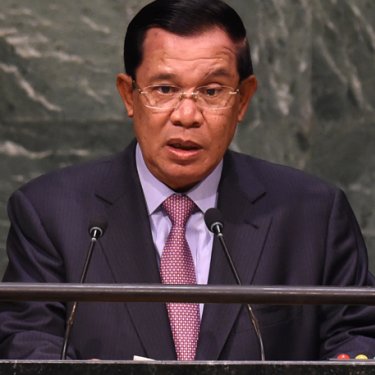Cambodia’s Universal Periodic Review: Press freedom ruthlessly crushed ahead of Sunday’s general election

On the eve of a Cambodian general election that is bound to be an appalling travesty of democracy, Reporters Without Borders (RSF) is publishing the contribution it recently sent to the UN Human Rights Council for the Universal Periodic Review (UPR) of Cambodia’s human rights record. The contribution is a damning litany of press freedom violations.
Ever since the opposition did unexpectedly well in the communal elections held in June 2017, Prime Minister Hun Sen’s regime has dramatically escalated its suppression of the freedom to inform, closing media outlets, intimidating and jailing journalists and manipulating social network content.
Fearing that they might lose their tight grip on power in the parliamentary election that is to be held on Sunday (29 July), Hun Sen and his associates have spent the past year systematically purging the Cambodian media of all critics and imposing their own version of events.
Bad legislation
During Cambodia’s last UPR in 2014, the Cambodian authorities undertook to strengthen the fragile Khmer democracy in various ways including a revision of its press law. Under one of the law’s provisions, publications can be confiscated without reference to the courts if they are deemed to “affect political stability.”
Media ownership is another problem. The failure to effectively restrict ownership concentration means that editorial independence and media pluralism cannot be guaranteed. Nonetheless, the Cambodian authorities did not keep their promise to the UN Human Rights Council to replace these provisions with legislation that conforms to international standards.
Government control of mass media
Instead, the ruling party has significantly increased its control of Cambodia’s mass media. The four biggest media owners already had nearly 85% of the country’s viewers, listeners and readers in 2017. And all are either members of the government or its advisers. They include Hun Sen’s daughter Hun Mana and Say Chhum, the current senate speaker and the ruling party’s vice-president. This formidable cartel’s control is now approaching 100%.
Relentless offensive
Cambodia’s independent media, which had displayed a great deal of professionalism and dynamism in an increasingly oppressive environment, were swept away in series of government offensives, the biggest of which was the arbitrary closure of around 30 outlets in the summer of 2017. They included Cambodia Daily, a newspaper that had accompanied Khmer democracy for decades, and the local bureau of US-funded Radio Free Asia (RFA).
Another pillar of Cambodia’s free press, the Phnom Penh Post, was acquired in May 2018 by a Malaysian businessmen close to Hun Sen. Its editor in chief, Kay Kimsong, was immediately fired while some of the newsroom staff resigned rather than comply with the new owner’s dictates. The newspaper changed overnight, turning into a docile government propaganda mouthpiece.
Journalists directly targeted
During the previous UPR in 2014, the Cambodia authorities undertook to “respect and protect the rights of journalists to conduct their work without hindrance, intimidation or harassment.” Instead, two former Cambodia Daily reporters, Aun Pheap and Zsombor Peter, have had to flee the country to escape prosecution on a trumped-up charge of inciting crime during their coverage of the June 2017 communal election.
At the same time, James Ricketson, a 69-year-old Australian documentary filmmaker, has languished in prison for more than a year for filming an opposition party demonstration. His children say they are alarmed about his declining health. Former RFA journalists Uon Chhin and Yeang Sothearin are likewise being held arbitrarily in Cambodia’s badly overcrowded Prey Sar prison. Their latest request for release on bail was denied on 23 July.
Collateral victims
They will complete their 257th day in detention far from their families on Sunday, election day. Like so many other press freedom actors, they are the collateral victims of the regime’s demolition of Khmer democracy.
Cambodia is ranked 142nd out of 180 countries in RSF's 2018 World Press Freedom Index, ten places lower than in 2017.



